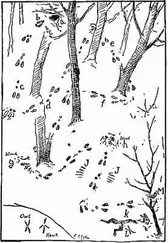Ernest Seton - Rolf in the Woods
Здесь есть возможность читать онлайн «Ernest Seton - Rolf in the Woods» весь текст электронной книги совершенно бесплатно (целиком полную версию без сокращений). В некоторых случаях можно слушать аудио, скачать через торрент в формате fb2 и присутствует краткое содержание. Год выпуска: 1997, Жанр: Приключения про индейцев, Исторические приключения, на английском языке. Описание произведения, (предисловие) а так же отзывы посетителей доступны на портале библиотеки ЛибКат.
- Название:Rolf in the Woods
- Автор:
- Жанр:
- Год:1997
- ISBN:нет данных
- Рейтинг книги:3 / 5. Голосов: 1
-
Избранное:Добавить в избранное
- Отзывы:
-
Ваша оценка:
- 60
- 1
- 2
- 3
- 4
- 5
Rolf in the Woods: краткое содержание, описание и аннотация
Предлагаем к чтению аннотацию, описание, краткое содержание или предисловие (зависит от того, что написал сам автор книги «Rolf in the Woods»). Если вы не нашли необходимую информацию о книге — напишите в комментариях, мы постараемся отыскать её.
Rolf in the Woods — читать онлайн бесплатно полную книгу (весь текст) целиком
Ниже представлен текст книги, разбитый по страницам. Система сохранения места последней прочитанной страницы, позволяет с удобством читать онлайн бесплатно книгу «Rolf in the Woods», без необходимости каждый раз заново искать на чём Вы остановились. Поставьте закладку, и сможете в любой момент перейти на страницу, на которой закончили чтение.
Интервал:
Закладка:
Ten miles they made that day. In the evening they camped on the shore of Jesup's Lake, proud and happy in the belief that they were the rightful owners of it all. That night they heard again and again the howling of wolves, but it seemed on the far side of the lake. In the morning they went out on foot to explore, and at once had the joy of seeing five deer, while tracks showed on every side. It was evidently a paradise for deer, and there were in less degree the tracks of other animals—mink in fair abundance, one or two otters, a mountain lion, and a cow moose with her calf. It was thrilling to see such a feast of possibilities. The hunters were led on and on, revelling in the prospect of many joys before them, when all at once they came on something that turned their joy to grief—the track of a man; the fresh imprint of a cowhide boot. It was maddening. At first blush, it meant some other trapper ahead of them with a prior claim to the valley; a claim that the unwritten law would allow. They followed it a mile. It went striding along the shore at a great pace, sometimes running, and keeping down the west shore. Then they found a place where he had sat down and broken a lot of clam shells, and again had hastened on. But there was no mark of gunstock or other weapon where he sat; and why was he wearing boots? The hunters rarely did.
For two miles the Indian followed with Rolf, and sometimes found that the hated stranger had been running hard. Then they turned back, terribly disappointed. At first it seemed a crushing blow. They had three courses open to them—to seek a location farther north, to assume that one side of the lake was theirs, or to find out exactly who and what the stranger was. They decided on the last. The canoe was launched and loaded, and they set out to look for what they hoped they would not find, a trapper's shanty on the lake.
After skirting the shore for four or five miles and disturbing one or two deer, as well as hosts of ducks, the voyagers landed and there still they found that fateful bootmark steadily tramping southward. By noon they had reached the south end of the west inlet that leads to another lake, and again an examination of the shore showed the footmarks, here leaving the lake and going southerly. Now the travellers retired to the main lake and by noon had reached the south end. At no point had they seen any sign of a cabin, though both sides of the lake were in plain view all day. The travelling stranger was a mystery, but he did not live here and there was no good reason why they should not settle.
Where? The country seemed equally good at all points, but it is usually best to camp on an outlet. Then when a storm comes up, the big waves do not threaten your canoe, or compel you to stay on land. It is a favourite crossing for animals avoiding the lake, and other trappers coming in are sure to see your cabin before they enter.
Which side of the outlet? Quonab settled that—the west. He wanted to see the sun rise, and, not far back from the water, was a hill with a jutting, rocky pinnade. He pointed to this and uttered the one word, "Idaho." Here, then, on the west side, where the lake enters the river, they began to clear the ground for their home.
Chapter 20.
The Trappers' Cabin
It's a smart fellow that knows what he can't do.
Sayings of Si Sylvanne.I suppose every trapper that ever lived, on first building a cabin, said, "Oh, any little thing will do, so long as it has a roof and is big enough to lie down in." And every trapper has realized before spring that he made a sad mistake in not having it big enough to live in and store goods in. Quonab and Rolf were new at the business, and made the usual mistake. They planned their cabin far too small; 10 X 12 ft., instead of 12 X 20 ft. they made it, and 6-ft. walls, instead of 8-ft. walls. Both were expert axemen. Spruce was plentiful and the cabin rose quickly. In one day the walls were up. An important thing was the roof. What should it be? Overlapping basswood troughs, split shingles, also called shakes, or clay? By far the easiest to make, the warmest in winter and coolest in summer, is the clay roof. It has three disadvantages: It leaks in long-continued wet weather; it drops down dust and dirt in dry weather; and is so heavy that it usually ends by crushing in the log rafters and beams, unless they are further supported on posts, which are much in the way. But its advantages were so obvious that the builders did not hesitate. A clay roof it was to be.
When the walls were five feet high, the doorway and window were cut through the logs, but leaving in each case one half of the log at the bottom of the needed opening. The top log was now placed, then rolled over bottom up, while half of its thickness was cut away to fit over the door: a similar cut out was made over the window. Two flat pieces of spruce were prepared for door jambs and two shorter ones for window jambs. Auger holes were put through, so as to allow an oak pin to be driven through the jamb into each log, and the doorway and window opening were done.
In one corner they planned a small fireplace, built of clay and stone. Not stone from the lake, as Rolf would have had it, but from the hillside; and why? Quonab said that the lake stone was of the water spirits, and would not live near fire, but would burst open; while the hillside stone was of the sun and fire spirit, and in the fire would add its heat.
The facts are that lake stone explodes when greatly heated and hill stone does not; and since no one has been able to improve upon Quonab's explanation, it must stand for the present.
The plan of the fireplace was simple. Rolf had been present at the building of several, and the main point was to have the chimney large enough, and the narrowest point just above the fire.
The eaves logs, end logs, and ridge logs were soon in place; then came the cutting of small poles, spruce and tamarack, long enough to reach from ridge to eaves, and in sufficient number to completely cover the roof. A rank sedge meadow near by afforded plenty of coarse grass with which the poles were covered deeply; and lastly clay dug out with a couple of hand-made, axe-hewn wooden spades was thrown evenly on the grass to a depth of six inches; this, when trampled flat, made a roof that served them well.
The chinks of the logs when large were filled with split pieces of wood; when small they were plugged with moss. A door was made of hewn planks, and hinged very simply on two pins; one made by letting the plank project as a point, the other by nailing on a pin after the door was placed; both pins fitting, of course, into inch auger holes.
A floor was not needed, but bed bunks were, and in making these they began already to realize that the cabin was too small. But now after a week's work it was done. It had a sweet fragrance of wood and moss, and the pleasure it gave to Rolf at least was something he never again could expect to find in equal measure about any other dwelling he might make.
Quonab laid the fire carefully, then lighted his pipe, sang a little crooning song about the "home spirits," which we call "household gods," walked around the shanty, offering the pipestem to each of the four winds in turn, then entering lighted the fire from his pipe, threw some tobacco and deer hair on the blaze, and the house-warming was ended.
Nevertheless, they continued to sleep in the tent they had used all along, for Quonab loved not the indoors, and Rolf was growing daily more of his mind.
Chapter 21.
Rolf's First Deer
Anxious to lose no fine day they had worked steadily on the shanty, not even going after the deer that were seen occasionally over the lake, so that now they were out of fresh meat, and Rolf saw a chance he long had looked for. "Quonab, I want to go out alone and get a deer, and I want your gun.
Читать дальшеИнтервал:
Закладка:
Похожие книги на «Rolf in the Woods»
Представляем Вашему вниманию похожие книги на «Rolf in the Woods» списком для выбора. Мы отобрали схожую по названию и смыслу литературу в надежде предоставить читателям больше вариантов отыскать новые, интересные, ещё непрочитанные произведения.
Обсуждение, отзывы о книге «Rolf in the Woods» и просто собственные мнения читателей. Оставьте ваши комментарии, напишите, что Вы думаете о произведении, его смысле или главных героях. Укажите что конкретно понравилось, а что нет, и почему Вы так считаете.




